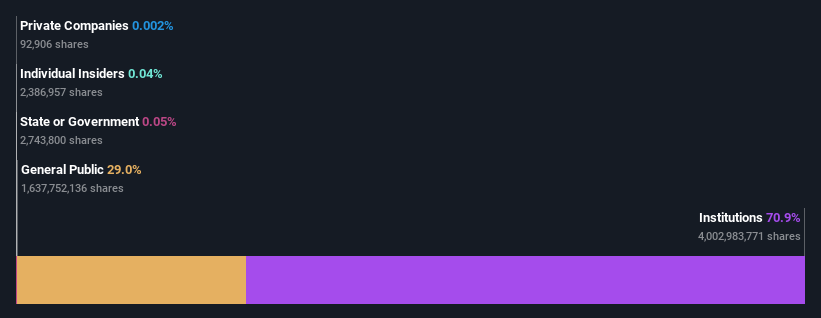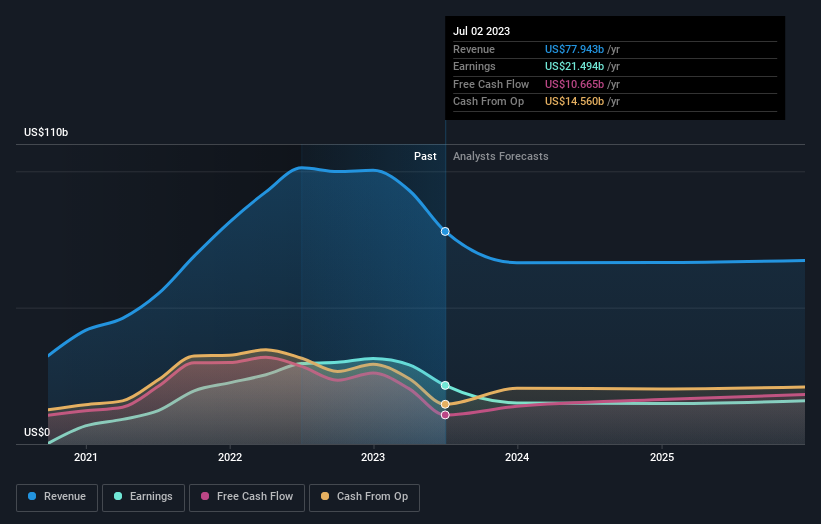- United States
- /
- Pharma
- /
- NYSE:PFE
Institutional owners may consider drastic measures as Pfizer Inc.'s (NYSE:PFE) recent US$8.6b drop adds to long-term losses

Key Insights
- Significantly high institutional ownership implies Pfizer's stock price is sensitive to their trading actions
- A total of 25 investors have a majority stake in the company with 46% ownership
- Analyst forecasts along with ownership data serve to give a strong idea about prospects for a business
Every investor in Pfizer Inc. (NYSE:PFE) should be aware of the most powerful shareholder groups. With 71% stake, institutions possess the maximum shares in the company. In other words, the group stands to gain the most (or lose the most) from their investment into the company.
And so it follows that institutional investors was the group most impacted after the company's market cap fell to US$194b last week after a 4.3% drop in the share price. Needless to say, the recent loss which further adds to the one-year loss to shareholders of 26% might not go down well especially with this category of shareholders. Often called “market movers", institutions wield significant power in influencing the price dynamics of any stock. Hence, if weakness in Pfizer's share price continues, institutional investors may feel compelled to sell the stock, which might not be ideal for individual investors.
Let's take a closer look to see what the different types of shareholders can tell us about Pfizer.
View our latest analysis for Pfizer

What Does The Institutional Ownership Tell Us About Pfizer?
Institutions typically measure themselves against a benchmark when reporting to their own investors, so they often become more enthusiastic about a stock once it's included in a major index. We would expect most companies to have some institutions on the register, especially if they are growing.
Pfizer already has institutions on the share registry. Indeed, they own a respectable stake in the company. This can indicate that the company has a certain degree of credibility in the investment community. However, it is best to be wary of relying on the supposed validation that comes with institutional investors. They too, get it wrong sometimes. If multiple institutions change their view on a stock at the same time, you could see the share price drop fast. It's therefore worth looking at Pfizer's earnings history below. Of course, the future is what really matters.

Institutional investors own over 50% of the company, so together than can probably strongly influence board decisions. Pfizer is not owned by hedge funds. The company's largest shareholder is The Vanguard Group, Inc., with ownership of 9.0%. For context, the second largest shareholder holds about 7.9% of the shares outstanding, followed by an ownership of 5.1% by the third-largest shareholder.
On studying our ownership data, we found that 25 of the top shareholders collectively own less than 50% of the share register, implying that no single individual has a majority interest.
While studying institutional ownership for a company can add value to your research, it is also a good practice to research analyst recommendations to get a deeper understand of a stock's expected performance. There are a reasonable number of analysts covering the stock, so it might be useful to find out their aggregate view on the future.
Insider Ownership Of Pfizer
While the precise definition of an insider can be subjective, almost everyone considers board members to be insiders. Management ultimately answers to the board. However, it is not uncommon for managers to be executive board members, especially if they are a founder or the CEO.
Most consider insider ownership a positive because it can indicate the board is well aligned with other shareholders. However, on some occasions too much power is concentrated within this group.
Our most recent data indicates that insiders own less than 1% of Pfizer Inc.. Being so large, we would not expect insiders to own a large proportion of the stock. Collectively, they own US$82m of stock. In this sort of situation, it can be more interesting to see if those insiders have been buying or selling.
General Public Ownership
The general public, who are usually individual investors, hold a 29% stake in Pfizer. While this size of ownership may not be enough to sway a policy decision in their favour, they can still make a collective impact on company policies.
Next Steps:
I find it very interesting to look at who exactly owns a company. But to truly gain insight, we need to consider other information, too. Take risks for example - Pfizer has 1 warning sign we think you should be aware of.
Ultimately the future is most important. You can access this free report on analyst forecasts for the company.
NB: Figures in this article are calculated using data from the last twelve months, which refer to the 12-month period ending on the last date of the month the financial statement is dated. This may not be consistent with full year annual report figures.
New: Manage All Your Stock Portfolios in One Place
We've created the ultimate portfolio companion for stock investors, and it's free.
• Connect an unlimited number of Portfolios and see your total in one currency
• Be alerted to new Warning Signs or Risks via email or mobile
• Track the Fair Value of your stocks
Have feedback on this article? Concerned about the content? Get in touch with us directly. Alternatively, email editorial-team (at) simplywallst.com.
This article by Simply Wall St is general in nature. We provide commentary based on historical data and analyst forecasts only using an unbiased methodology and our articles are not intended to be financial advice. It does not constitute a recommendation to buy or sell any stock, and does not take account of your objectives, or your financial situation. We aim to bring you long-term focused analysis driven by fundamental data. Note that our analysis may not factor in the latest price-sensitive company announcements or qualitative material. Simply Wall St has no position in any stocks mentioned.
About NYSE:PFE
Pfizer
Pfizer Inc. discovers, develops, manufactures, markets, distributes, and sells biopharmaceutical products in the United States, Europe, and internationally.
Good value average dividend payer.


